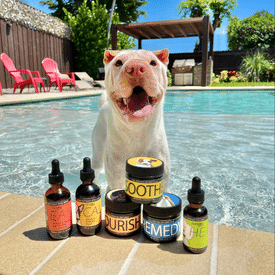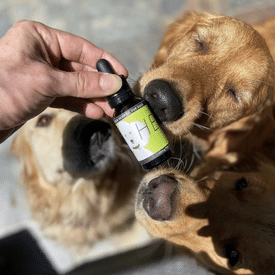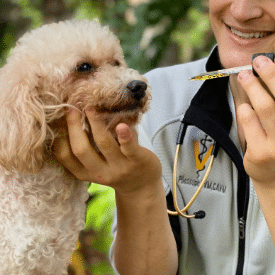Fighting Canine Cancer with Chemotherapy and CBD

Cancer cells are much different than normal cells found within the body because, unlike normal cells, cancer cells never die on their own. Normal cells in the body undergo a process known as apoptosis, or cell suicide, resulting in ‘damaged’ cells, or cells that are no longer needed, being eliminated and excreted from the body.
Cancer cells have the ability to grow, thrive, and mutate to form tumors. Then, they proceed to carry themselves throughout the body. Since these cells don’t die on their own, there isn’t much of a ‘stopping force’ to prevent cancer from spreading and not only surviving but thriving, in our bodies.
Cannabis and chemotherapy are among the tools used to combat cancer in both humans and dogs. If you have ever learned about cancer, even only human cancer, you’ll likely recall marijuana being provided to cancer patients to reduce nausea, calm anxiety, and help with treatment overall.
Cannabis has been integrated into medicine for thousands of years. Cannabinol (aka CBD), and THC have been found to have intense health benefits. Delta-9-tetrahydrocannabinol (THC), the psychoactive portion of the cannabis plant, has also been found to be extremely helpful in regard to cancer.
Chemotherapy is often incorporated into any cancer treatment regimen and, luckily, is often well-tolerated by our dogs in an effort to kill cancer cells. Chemo in combination with CBD can prove helpful in reducing side effects as well as assisting in targeting cancer cells.
Table of Contents
Chemotherapy for Our Dogs
When a dog is treated using western medicine, it often involves the use of chemotherapy, surgery, and radiation. In many cases, it’s a combination of all three. The type of treatment, as well as the stage of cancer, are factors taken into consideration when a dog is being treated.
Chemotherapy to treat our dog’s cancer can be overwhelming especially when we see what our friends and family have endured in their chemo treatments. You imagine your dog losing her fur and becoming extremely fragile. Fortunately, the effects of chemo aren’t the same in dogs as they are for humans in most cases.
There are side effects with chemotherapy for our dogs, but they aren’t exactly as many of us picture. The side effects of chemotherapy generally appear 3-4 days following chemo treatment in our dogs and may last for up to 48 hours.
Some dogs walk away from their chemo treatment with minor side effects like fatigue and just feeling a bit groggy. Other dogs are more sensitive to chemo and may experience other side effects including:
- Gastrointestinal upset
- Minor hair loss
- Lowered white blood cell count
- Skin irritation (rare)
- Neuropathic pain (pain in the nerves)
Every dog is different, just as every person is different, and will react differently to the chemo treatments.
Depending on how intense the chemo treatment is, nausea may be apparent as well. Nausea and vomiting are common side effects of chemotherapy treatment. Nausea occurs when a sensory center in the brain, associated with the digestive tract, becomes stimulated. According to The Canadian Veterinary Journal, “if the signs are mild, patients can be managed at home. Nothing per os (NPO) for a day followed by a bland diet is usually sufficient. Animals that are more severely affected may require hospitalization with IV fluids and anti-emetics.”

MDR1 Mutation and Chemo
There are some dog breeds more prone to chemotherapy sensitivity due to a genetic mutation known as MDR1. Dogs with this genetic mutation often show symptoms of chemo more than others. Some veterinary oncologists may refer to genetic testing to see if the dog has the mutation or a lower dosage may be provided to begin if it’s suspected.
CBD and Cancer
Research has shown CBD can cause cell death in cancer cells; and, stop tumor growth. This prevents metastasis or the spread of cancer. For dogs who are experiencing inadequate appetite, CBD can also help by increasing a dog’s appetite keeping the immune system in better shape.
Another common occurrence in cancer cells is angiogenesis. Angiogenesis is the ability of cancer to create its own network of blood vessels within the body. CBD (and THC) can prevent the development of blood vessels found in tumors, therefore, blocking their source of nutrition. Essentially, starving the cancer cells to death.
There aren’t currently any long-term clinical studies in regard to CBD oil for dogs. But, there’s a sufficient amount of research to make it a good candidate for further research in this field.
CBD and Chemotherapy
When reviewing the available research, CBD has been found to manage the symptoms explained above. Stimulation of the endocannabinoid system (ECS) can help to manage inflammation and pain caused by cancer treatments.
Also, according to research published in the International Journal of Oncology, “The sequence of administration of these drugs was important though; using cannabinoids after chemotherapy resulted in greater induction of apoptosis [cell suicide], whilst this was the opposite when the schedule of administration was reversed. Our results suggest that when certain cannabinoids are paired together, the resulting product can be combined synergistically with common anti-leukemia drugs allowing the dose of the cytotoxic agents to be dramatically reduced yet still remain efficacious.”
Another study, published by Current Oncology, found “in addition to the well-known palliative effects of cannabinoids on some cancer-associated symptoms, a large body of evidence shows that these molecules can decrease tumor growth in animal models of cancer.” This study found tumor cell proliferation decreased due to cannabinoids’ ability to communicate properly with the body. This study went on to state “given that cannabinoids show an acceptable safety profile, clinical trials testing them as single drugs or, ideally, in combination therapies in glioblastoma and other types of cancer are both warranted and urgently needed.”
Final Thoughts
Dogs who are undergoing chemotherapy treatment for their cancer may or may not experience side effects. Even dogs who do not experience side effects can benefit from the therapeutic mechanisms of cannabis. Targeting cancer in our dogs should be a joint effort from multiple angles. Combining chemotherapy with cannabis can assist in reducing the spread of cancer and potentially assist in the complete eradication of cancer. Whether it’s a small step in the right direction or a large step in the right direction, CBD has proven worthy of the fight. Any step in the right direction is necessary when handling conditions such as these.















